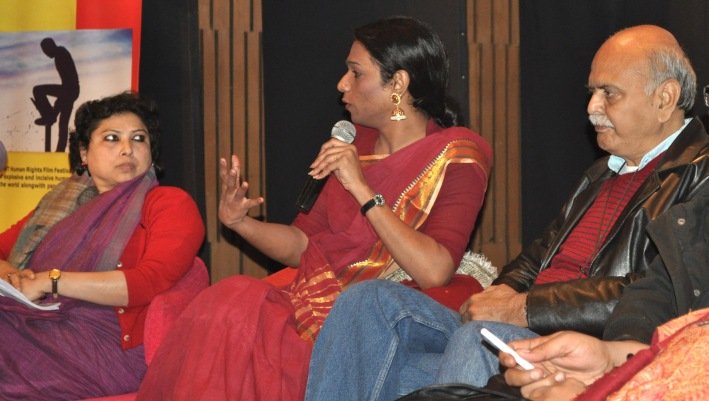Every Individual has the capacity to stand up to human rights violation
2nd Flashpoint Human Rights Film Festival concluded in Delhi today with Nandita Das’s Firaaq (Separation), a stark but moving portrayal of the aftermath of the Gujarat riots of 2002.
The film, which ran to a packed house, reflected the spirit to come to terms with violence. In her message read out at the screening Das said the film is a means to stir a dialogue about our own fears, prejudices and responses to violence. “Even after three years since the film was made, it is as relevant and a dialogue about communal violence as important,” she said.
Flashpoint as the name suggests is organised to introduce a spark of awareness about Human Rights in people, just as the screening of the films on Omar, Sindutai and Sampat Pal managed to do.
Luc Cote the film maker of You Don’t Like the Truth: 4 days inside Guantanamo Bay recounted the outrageous violation of Human right of a young Canadian boy, Omar, arrested in Afghanistan by the United States’ army and tortured during interrogation at the high security prison Guantanamo bay. At a panel discussion after the show, Luc said “What can you do when the entire system is bereft of any values and violate the rights of even a teenage boy. Omar pleaded guilty to his charges of terrorism in exchange for a reduced eight year prison term”, he said adding that Omar remains brave to this day and wants his story be told and knows right now that this film about him is being shown in New Delhi.
The audience was also moved by the story on Sindutai Sapkal, the indomitable ‘mother’ of 1000s of orphaned children. To transcend a mood of death and give life a chance is the theme of the film Mee Sindutai Sapkal, directed by Anand Mahadevan. “I am glad that the film is showing at a Human rights festival as empowerment of women is one of the most urgent issues to be addressed and cinema is a powerful means to do it”, Mahadevan said in his message.
Pink Saris is the inspiring story of Sampat Pal who founded the ‘Gulabi gang’ to get abandoned and abused women, their rights in the ultra conservative UP hinterland. “I was attracted to Sampat Pal’s story as I enjoy watching films about people who are struggling for change rather than films about ‘victims’, Kim Longinotto, director of the film said in her message, “The genius of Sampat is that she brings taboo subjects out into the open and makes people challenge their own beliefs. I have learnt a lot from her and her insistence that the shame in abuse lies with the perpetrator and not the person they have been abusing”, she added.
Bullied, which focuses on the torment of a gay Teenager in the US who is harassed for years by his classmates and finally has the courage to take the entire education system to court and Sarabah which deals with female genital mutilation in Africa were some of the films screened pertaining to violence based on gender and sexual orientation.
Transgender activist Abheena Aher said at the panel discussion on the issue that violence is not just physical but also physiological. It starts in the family from the day they discover that a child is different. Then it continues throughout life, she said adding that “I’ve been struggling to get a PAN card for the past several years but since my sexuality is not recognized in the official forms, I’m unable to procure it”’ she said.








